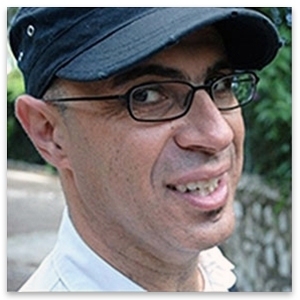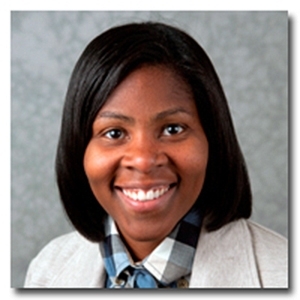English Matters - Fall 2020
A newsletter for faculty, students & alumni of the Grand Valley State University English Department
Notes from the Department Chair, Dr. Ashley Shannon
Welcome to the Fall/Winter 2020/2021 issue of the English Department’s newsletter. One reason why our newsletter is different (and, we think, even more worth reading) is that it contains actual news—that is, new information, things you couldn’t learn from other GVSU publications or even our department’s website. For example, in an interview with Dr. White, Professor and Associate Chair, you will find commentary on education and academia during the COVID-19 pandemic. Additionally, students share some ways that they have experienced school in the midst of this pandemic in the form of Six Word Stories; you’ll find those dispersed throughout the issue. We hope to use this newsletter to open the doors of our department to our readers, our present and former students and their families, and, perhaps, to future students. We want to welcome you into a behind-the-scenes look at what drives and motivates the excellent teaching and scholarship our professors bring to the work of the English department. To that end, readers will find the REVELATIONS section, in which faculty members “reveal” something eye-opening about their lives and work. Finally, in this issue we introduce a new section to be found in each issue, “The Proust Questionnaire.” It’s a lighthearted way to see what’s on the minds of our alumni, current students, faculty, or our staff. Our inaugural contributant is alumna, Ruth Reiniche (MA English, ’06). We hope you enjoy this issue and that you are inspired by this window into the inner workings of the department.
[1518122388].jpg)
English Department Chair, Dr. Ashley Shannon
Interview with Dr. Brian White, Associate Chair
For faculty and students alike, this year has been more chaotic than usual. To learn more about faculty perspectives in this challenging time, Dr. Brian White, Associate Chair in the English Department, shared how the new demands of COVID-19 have impacted his work. Dr. White begins with changes he’s had to manage with the transition to teaching classes online.
What has it been like teaching and working as the Assistant Chair this year in comparison to previous years?
A difficult question to answer, because the job is often remote: answering emails or figuring out if a student transferring to GVSU from a community college in Texas can still get their credits transferred. That aspect hasn’t changed much, except that the meetings are now virtual. Teaching is another matter. Teaching is radically different.
What has been the most difficult part of adjusting?
I’m going to cheat and give you two things that have been difficult.
One is the sense of distance between myself and students. I feel like I know my students less; for example, part of my job in a regular semester is watching student teachers teach in their physical classrooms. After they’re done with the lesson, we go to the school library and talk about the instruction I just observed. It’s amazing what you can learn about a teacher by walking into their space and seeing how the students respond to them. It’s also good to see how students treat the teacher after the instructor’s back is turned. This semester, I’m watching a video feed. The student teachers set their iPhones or laptops up in the corner, so I can’t see the students. Sometimes the teacher I’m observing walks out of range and I can't see them, either, so I feel disconnected and cut off. It’s not that I can’t learn from the session or be of help, it’s just that so much of the human element has been removed. You lose the kinds of things that, as a teacher, you know simply by walking into a room. Things you can’t articulate, like the mood of the class, which is so important, but is a sense that you get only when you walk in and read body language and see the looks on students’ faces; you can tell how tired or interested they are in the subject matter. I can’t tell any of those things by video.
The second thing [that’s been difficult is], my own teaching, which has been mostly virtual. I think that for the most part, I've been able to develop a classroom community and some kind of connection with my students, but I don't know that I trust my sense of it. I don’t have those human indicators anymore. I tend to rely on small group instruction for many of my classes, and what my students might not know is that I'm standing near Group A, but I'm listening to Group B. I can listen to them without bothering them or interrupting their flow. Joining a group on Zoom means interrupting; I wasn’t there before and then suddenly I am. In a virtual environment, it feels like I'm checking to see if they’re on-task. It’s disruptive and embarrassing, but sometimes I drop in and they were talking about a football game. So I have lost that sense of connectedness with my students. I have a lot less human data to draw from; more tech tools, but fewer human tools. I don’t know how they’re interacting with one another when I’m not there, so it’s harder to know which groups are getting along and which aren’t. I have to do the exact thing I’m teaching these young future educators not to do: turn your back on a classroom.
I’m just not sure that I'm very good at it. I’m relatively senior, right? So, lots of these tech tools are new to me. I’ve had the standard training, but those tools were like foreign languages to me before all of this started. I was very thankful that I had already done the GVSU hybrid class training when last March happened. My start then, when we went virtual, was very rough. My students were very patient and fantastic. They were so polite, and I learned a lot both from students and from professional development. But I still wonder, how am I doing? I’m certainly doing the best that I can, but I’m always wondering.
What has been the most successful part of the change to online classes, in your opinion?
The most helpful thing to my students is my organization. The content modules are very helpful, according to them. I can put all the PowerPoints and handouts in folders by week or by subject matter or topic. According to my feedback, good and standardized organization is very important, as is availability.
What’s helped me the most is learning from the experts, like GVSU’s technology people, who are also fantastic teachers and incredibly available. If I email with a question or concern, they get back quickly and they have answers that actually help. Trying things helps too, like: I’ve never made a video like this before but here we go. I’m going to try it! And, then I get feedback from students on what could be improved or what worked well.
There’s this favorite activity that I love to do, but I thought it would be impossible in an online environment. I kept thinking about the logistics of it and then one day I thought: I wonder if it would work if I did this differently online. And it worked! It maybe wasn’t the same, maybe it wasn’t quite as good, but by taking a tool, a regular thing that everyone uses, and manipulating it a little bit, I realized that I could do the activity! It wasn’t exactly as I’d planned, but after giving it a try, guess what? It did work. I remember thinking to myself, Here’s what this means: If there’s something you really want to do, then you can figure out a new way to do it.
No real failures yet, but I’m ready for next year and all those new experiences.

English Department Associate Chair, Dr. Brian White
Student Spotlights
Undergraduate Students
Jasmyn Pearson - English Major, Language & Literature emphasis
Ever since she was a child, Jasmyn Pearson knew that she wanted to study law. As she progressed through high school, she was encouraged in this desire by her relatives and family friends, many of whom worked in the legal field themselves. They knew that Jasmyn’s wit and determination would help her to become an excellent lawyer, and they were excited when they heard that she planned to attend Grand Valley in order to prepare for her time at law school.
When Jasmyn told these friends and relatives that she was majoring in English literature as part of that preparation, however, many of them were confused. Given Jasmyn’s passion for justice and legal reform, they had assumed that she would choose a major such as criminal justice or political science, certainly something other than literature. Jasmyn understood, however, that in order to be effective in her future career, she didn’t only need to understand the workings of the law; she also needed to understand the human element behind the law, and she needed to be able to communicate clearly and effectively about that human element. She believed that the best way to gain the insights and communications skills she was seeking was to study English, and her first two years in the program at GVSU have thoroughly affirmed that belief.
One moment that stands out in her mind as being especially valuable occurred while she was discussing a novel in one of David Alvarez’s courses. The text—Tell Me How it Ends by Valeria Luiselli—caused her to think in entirely new ways about immigration and national borders. “All I wanted to do was talk to people about it,” she said. “It completely changed my way of thinking.”
By leaning into such experiences, Jasmyn is not only developing new ways of thinking for herself; she is also preparing herself to bring new ways of thinking into the world of legal discourse.
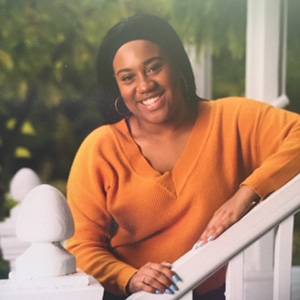
Jasmyn Pearson - English Major, Language & Literature
Erica Modderman - English Major, Elementary Education emphasis
English Language Arts student, Erica Modderman, was recently featured as an Adult Learner by the Center for Adult and Continuing Studies. When asked about her experiences as an English major, Erica shared the following:
"My passion for English runs deeper than 'I like to write' or 'my favorite class is Language Arts.' Literature is my muse and writing is my passion. My field is English for multiple reasons and I am aware of what is involved with the profession. The passion to teach the subject of English and encourage children to read and write is something I want to instill in my future students. I get excited to have book discussions and even when one of my own kids reads a word right. I could go on for hours talking about a book I just read, or if left alone to my own devices I can easily spill my soul into my laptop. I enjoy writing because I can come up with my own unique ideas that I have not read before on my own.
I am the first person to admit when I have screwed up and the first person to sit down and say 'I don’t know.' On paper that contribution does not seem very productive - and I understand that. However we live in a day and age when many people feel as if the more answers they have, whether they are good or bad, the more respect they need. Call me old fashioned, but I believe that Plato had the right idea when wisdom comes from people who are willing to admit that they truly 'don’t know.' Our society needs to listen more - and I am willing to give an ear. My intellectual tradition developed from an agnostic viewpoint of an interest in the supernatural and fictional to being Baptized and still never losing my interest in abstract studies and thought. Books such as Mary Shelly's Frankenstein taught me quite a bit. Authors try to convey ulterior motives within a text that could easily be read at the surface level that women can make intellectual dents in a male-dominated world. Other works such as Beowulf taught me to enjoy the ride of fantasy. That even stories from centuries ago have as much of a valid right to be considered in our lives and it still has the ability to transport you to another place in another time.
I hope to find a teaching job that is in west or southern Michigan so I can be close to family and my husband’s job. I know who I am and where I am going. I hope that with the path I have laid out before myself is a road that inspires others too."
Read more about Adult Laker Learners here.

Erica Modderman - English Major, Elementary Education emphasis
Jasmine Wilson - English Major, Secondary Education emphasis
Jasmine Wilson has always been passionate about reading books, literature, and all things grammar, but her passion for teaching and education did not arise until her freshman year of high school. Given that education holds a particular significance in her life, she decided to pursue a degree in secondary English education. She also shared that, “Along with this passion for knowledge, I decided to pursue this degree because there are not enough Black teachers in the Education field. As a Black woman who has been deeply and positively influenced by Black educators in my life, I know how crucial it is for other Black students to be able to see and be taught by someone who looks like them.”
One of the most impactful courses Jasmine has taken in the English Department was World Mythology, taught by Dr. David Landrum. Described as “not your traditional Mythology class,” she entered the class lacking both knowledge and interest about mythology, but expressed gratitude in the role the course played in expanding her interest in genres she might not have otherwise explored. “We explored so many novels that I would have never considered as Mythology.” While Jasmine’s time at GVSU has been influenced by courses in the English Department, she’s benefited from the breadth of the liberal arts education that the university has to offer. She specifically cited Dr. Ayanna Weekly’s Black Women's Culture & Communities African/African American Studies course and Dr. Olivia Williams's Diverse Perspectives on Education course as being particularly impactful. Speaking specifically about Dr. Williams’s course, Wilson said, “This class taught me, and I hope, others in the class that there is always more work to be done as Educators in order to dismantle harmful and racist systems. Taking this course has also inspired me to eventually pursue a Ph.D. in Higher Education, which I did not believe I could do before taking this course.”
Wilson proudly joined the English National Honors Society, Sigma Tau Delta, and completed her Capstone this semester. “It has been challenging, and I am thankful for all the overflow of help and support from my professor, Dr. Amy Masko. I am pleased with all the work and dedication that I put into the class, and that I have put into this degree. I am forever grateful!”
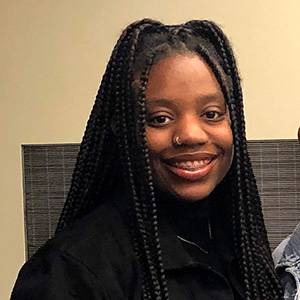
Jasmine Wilson - English Major, Secondary Education emphasis
Kimberly Van Hecke - English Major, Secondary Education emphasis; Applied Linguistics Minor
It wasn’t until recently that Kimberly Van Hecke opted to add the Teaching ESL/Applied Linguistics Minor to her degree program. “Halfway into my junior year semester I was in a Psychology class for my previous minor, and the Teaching ESL course. I realized I was more interested in being a part of the Applied Linguistics and Teaching ESL minor because in the Teaching ESL course I learned things that I think all teachers should learn to best help their students, whether English is their native language or not.”
Some of Kimberly's most memorable and applicable courses in the English Major are Teaching ESL, Critical Issues in K-12 Literacy. She indicated that these are, “the best courses I took that I felt really prepared me for the different students I will have in the future and taught me how to best support those students no matter their backgrounds.” The courses she took abroad in Ghana the summer of 2019 (which included Multicultural Children's Literature and Early African American Literature) were impactful in different ways. “In Ghana I learned a great deal about the Transatlantic Slave Trade and the truth I had been hidden from in my early history teachings in school. The truthful education I have received at Grand Valley, in the sense of how to best teach my future students, and to finally understand the history of our country has greatly impacted me. I am very passionate about truthful education - I even just finished my Capstone project on it!”
Van Hecke cites the completion of her Capstone project and her study abroad trip to Ghana as two of the things she’s most proud of during her time as an English major. “My summer abroad in Ghana…taught me more than I could have imagined.” She describes her Capstone project as “the biggest academic achievement I have completed to date, and I am proud of the work I did on it. I was challenged in so many ways as I researched and wrote about my passion to teach truthful education.”
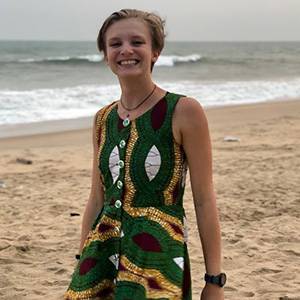
Kimberly Van Hecke, AL minor, on the beach in Ghana
Six Word Stories
Most taken for granted: human touch.
Nicole Hinman
Writing Major; English minor
Respirated grandparents give farewells to phones.
Seth Miller
English Major, Language & Literature
I swallow memories of gentler times.
Sidra Elvey
English Major, Language and Literature
Applied Linguistics Minor
Graduate Students
Katy VandeWaa, Master of Arts in English student
Katy VandeWaa is fast.
At least that is the impression one gets when learning about her life. She not only enjoys running and traveling the world—she runs about four miles each day and she is currently planning a family vacation to Ireland post-COVID—but she also moves quickly toward her goals. While studying at Grand Valley, she completed both a bachelor’s degree and a master’s degree in just four years. While doing so, she met and began dating her husband, who was also completing his master’s degree in English at GVSU.
After graduating and getting married, Katy directed her energy toward her career goals. She took on a role at a small advertising firm, where she was responsible for editing and managing online content. From there she transitioned to a local B2B company, where she performed similar work, before accepting a job in digital marketing at Spartan Nash. Currently she works for Amway as a Data Analyst.
In each position she’s held since graduating with an MA in English, Katy has relied heavily on the training she received while at GVSU. Not only did the experience of writing in-depth papers prepare her for the rigor of the work she currently does as a Data Analyst, but also the study of literature has helped her appreciate the need to present information in narrative form. “A lot of people believe that data analysts just focus on the numbers,” she says, “but I understand that those numbers are most effective if I am able to help others see the story that they tell.”
By telling that story effectively, Katy has been able to help steer the companies she works for toward their goals, and—just as importantly—she’s been able to help them reach those goals as quickly as possible.
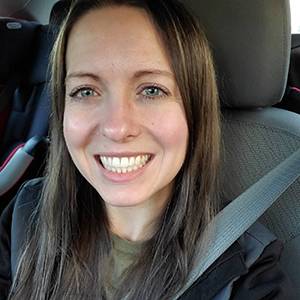
Katy VandeWaa, Master of Arts in English student
Carly Vaitkevicius, Master of Arts in Applied Linguistics student
Carly Vaitkevicius had her paper, "OK, Boomer: The Impact of Age Based Language Ideologies," included as part of a peer-reviewed journal associated with the Richard Macksey National Undergraduate Humanities Research Symposium at Johns Hopkins University. This accomplishment was highlighted by GVNext in a November 2020 article.
The research emerged as an extension of a project Vaitkevicius had done as part of an undergraduate sociolinguistics class. Her work discusses the origin of the term “OK, Boomer” and how it likely began on TikTok, which is used predominantly by Generation Z. According to the article, “[Vaitkevicius] noted in the paper that the discourse around political elections is a particular breeding ground for stereotypes. ‘OK Boomer,’ prominent in 2019, was part of a political discussion influenced by the impending presidential election that "allowed for these insults to take on a more political flair which, nonetheless, continued to press the ageist ideologies." Even former presidential candidate Michael Bloomberg became a variation of the phrase because of how his name is spelled.”
Professor Kate Remlinger encouraged Vaitkevicius to contribute to the symposium. As Peg West notes in the GVNext article about Carly's presentation, Remlinger thought the work especially illuminated the schism between the generations and is an important example of sociolinguistics. "At the heart of this," she told West, "I want students to know they have a role in shaping language and perceptions.”
Vaitkevicius received her BA in English from GVSU in April 2020 and is now completing her MA-AL. The full article that appeared in GVNext can be found by visiting this link.
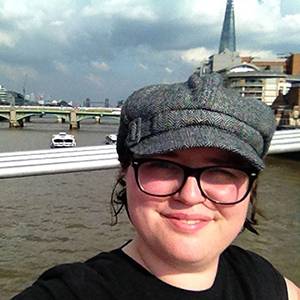
Carly Vaitkevicius, '20; MA-AL student
Six Word Stories
Scars are signs of a competitor.
Emma Goshgarian
English Major
Education Major
She wept, and slept, and hoped.
Hannah Barnett
English Major, Secondary Education
Applied Linguistics Teaching Minor
Your mirror becomes your only confidant.
Haley Marek
English Major, Elementary Language Arts
Alumni Spotlights
Razel Jones, '07
In Wounds (2020) a collaborative memoir, authors Razel Jones (English, ’07) and Daniel Abbott explore their experiences with prejudice and racism as they grew up. Friends since they were young boys, Jones, an African American, and Abbott, a white American, share the intersections and divergences of their experiences growing up in rural northwestern Michigan. A short review of the book notes, “These true stories will cause those who have experienced similar racism to resonate with the cycles, behaviors, and responses. They will inspire allies to emotionally connect and dive deeper into realization of the patterns of oppression. All readers will grow in empathy, and be compelled to amp up efforts to be more anti-racist, culturally intelligent, and effective in standing against inequities.”1 In the following interview, the co-authors discuss their collaboration and the experience of writing Wounds in the current socio-political context in the USA.
What was the most difficult part of collaborating with another person? What made it difficult?
DA: I think we both brought our own vision to Wounds with a common goal: To make people think differently about difference and be motivated to impact their spheres of influence. I brought with me my experience in creative writing. Razel brought with him his experience working in diversity, equity, and inclusion. For Wounds to do the work of achieving our common goal we had to wrestle a bit, compromise, and really evolve in our understanding of what our book was.
Which chapter/section/anecdote from the book is your favorite and why?
RJ: My favorite chapter is “It Never Rains in Southern California.” It gave me the opportunity to play with form and be a bit more creative than I was able to be in the other chapters. In the chapter, my 43-year-old self visits my 19-year-old self at a moment in our life that proved to be life altering, and considers what, if anything, he would change along the journey.
DA: My favorite chapter is one that Razel wrote, “White Girls are Illegal.” During our drafting process that was the chapter where Raz started finding his voice and letting loose on the page. It was awesome to witness.
What does your writing process look like?
RJ: I’m a brooder; I never just sit down and write. My stories always have a basic arc before I begin a draft. I build my first drafts carefully, a sentence at a time, polishing as I go. I construct the bones, so to speak, then build the muscle, define the muscle as I go along.
Which topic was the most exciting for you to write about? The most challenging?
DA: To have written Wounds was exciting. [The process of] writing Wounds was not. I revisited childhood trauma and negative adult experiences. We wrote the book during COVID: our children home from school; our spouses working full-time from home; Raz still working his full-time gig; me taking care of a newborn and a four-year-old. But, the most challenging part was compressing what felt like 500 pages into the 130-page book we published. We had to cut a ton of good material and find creative ways to select and piece together profound moments in our lives to create one cohesive narrative.
What advice would you give to other authors of a memoir?
RJ: Be both brave and reflective. To put yourself out there is terrifying. To think deeply about those moments in your life that haunt you, that have shaped your defense mechanisms, the nuances that make you you, is both therapeutic and painful. But, you can learn a lot about yourself from those experiences and you can teach others with your pain.
If you could have anyone in the world read this book start-to-finish, who would you choose and why?
DA: Diane Cartwright, [my adoptive mother.]2 She is the center of my portion of the narrative in Wounds. We lost her a few months before we started writing the book. I never told her what she meant to me. I know she knew I loved her, but I’m not sure she knew what an impact she had on my life, how much she shaped me and prepared me for the world. Wounds reveals these things I never told her. I hope it honors her. If she’s watching, I hope she’s proud.
_________________________
1https://www.amazon.com/Wounds-Razel-Jones/dp/1735363731
2Diane Cartwright was Abbott’s Black adoptive mother later in his young adulthood. A mother to four biological children, one adopted son (Daniel), and the rest of her community, Diane provided safety, respite, and joy, despite her economic and physical hardships. Abbott credits Cartwright as the “root of [his] cultural navigational experience” and as having “played an integral role in both the development of [his] cultural lens and who [he is] as a husband, father, and human being.”
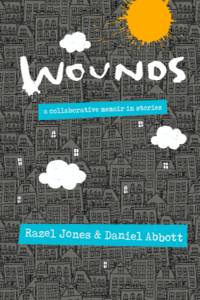
Wounds, a memoir by Razel Jones, '07 and Daniel Abbott was published in November 2020
MA-AL Alumni Updates
Recent communications with our alums found them happily working at various fronts: Danqing Yang found a job teaching preschool at Goddard School of Millburn in New Jersey and recently transferred to her new position as a 1st -3rd grade teacher at Jump Immersion School in New Jersey teaching Chinese as a second language. Abdul Almosa is currently a university instructor in Saudi Arabia teaching English to non-English majors. He reports that English is an important second language in Saudi Arabia and almost all jobs require English as a condition for hiring in the country. Ben Sparks, with his BA in Classics and MA-AL from Grand Valley, secured a prestigious position last year with JET (Japan Exchange and Teaching) program and is now teaching English as a foreign language in Japan. Yihua Xu, another of our MA-AL alums, is currently teaching Chinese at Zeeland Christian School.
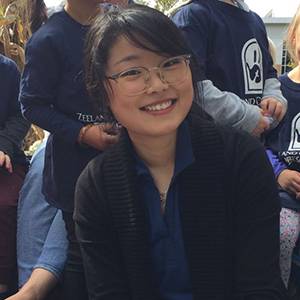
Yihua Xu, Master of Arts in Applied Linguistics, '18
Faculty Spotlights
David Alvarez, PhD
Professor David Alvarez, who teaches courses in contemporary world literature and researches literary representations of migration from North Africa to Europe, has published a translation of a travelogue by Moroccan academic and former Minister of Education, Abdallah Saaf. A Significant Year (Une année considérable in the original French) is the author's account of his travels around Morocco in the months leading up to the country's 2007 national elections, the second to have been held under King Mohammed VI. In addition to providing vivid portraits of Morocco's varied people and places, the author ponders the country's problems and promise fifty years after it gained independence from France and Spain. Published by Seagull Books (Calcutta and London), in the US A Significant Year is distributed by the University of Chicago Press.
Dan Brown, PhD
Professor Dan Brown was awarded a Graduate Student Associate Faculty Mentor Award during the Winter 2020 semester. Each semester, the GSA asks graduate students to nominate faculty members that have made an impact upon them in a variety of ways. Professor Brown was nominated by Master of Arts in Applied Linguistics student, Sarah Parlette, who said, "Dr. Brown goes above and beyond to be a mentor and a professor to students. He is supportive and encouraging, both academically and professionally. He offers advice to students to ensure that they are working towards success. He also meets with students beyond his office hours to help students in any way he can. He is an outstanding mentor that continuously exemplifies through his actions what it means to care for his students."
Sherry Johnson, PhD
During the Fall 2020 and Winter 2021 semesters, Dr. Sherry Johnson is facilitating a Faculty Learning Community (FLC) focused on how writers, artists, and musicians depict legacies of slavery in the contemporary transatlantic spaces. The learning community uses thinker, Christina Sharpe's In the Wake: On Blackness and Being (2016) as the foundational text for the group's discussions. This FLC is the second of two learning communities that look at the relationship between water and Africa and the black diaspora. In Part one of this discussion series (FW 19-20) the group discussed Kevin Dawson's Undercurrents of Power: Aquatic Culture in the African Diaspora (2018).
Karen Pezzetti, PhD
Professor Karen Pezzetti was one of seven faculty members from across the university to receive the Pew Teaching Excellence Award for 2020. The award offers GVSU faculty an opportunity to celebrate the work of their peers as teachers who inspire our students across the disciplines.
Professor Brian White, who nominated her for the award, enumerated the reasons Professor Pezzetti was a deserving recipient: "Every semester, I speak with students whom she has led into new understandings, new areas of interest, new and passionate commitments." Her impact is not only seen and felt by her students, but by her colleagues as well. White continued by noting that fellow English Education faculty who have watched Professor Pezzetti teach "agree that her classroom is a place where important ideas and foundational theories are discussed, debated, and understood enthusiastically; the students engage those ideas and one another eagerly and thoughtfully. Professor Pezzetti sets the stage for these rich interactions by planning carefully, by teaching masterfully, and by being so obviously herself: authentic, vulnerable, brilliant. No wonder her students find her teaching so transformative." The English Department - both faculty and students alike - are grateful for all of Professor Pezzetti's contributions. Congratulations on this well-deserved award!
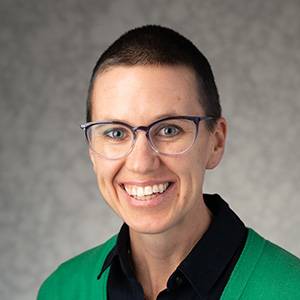
Professor Karen Pezzetti
Rob Rozema, PhD
This year brought the first issue of Ought: The Journal of Autistic Culture, co-edited by Professor Rob Rozema. The journal, which Professor Rozema describes as “the first of its kind,” "attempts to document autistic culture in both scholarly and creative ways." According to the journal’s official description, “Ought recognizes that autistic culture is not monolithic: it is as varied as the autistic community itself. Accordingly, Ought focuses contributions of the autistic community, celebrating the visual and verbal accomplishments of autistic scholars, artists, and others. At the same time, it also showcases the work of the scholars, scientists, parents, and professionals who share everyday experiences with autistic people and influence their lives. In blending creative and critical works about autism, Ought seeks to break down barriers between academic disciplines, between genres of artistic expression, between caretakers and professionals, and finally, between neurotypicals and autistics. Ought is the conversation about autism as it ought to be."
The most recent issue hit a new milestone in that the majority of the contributors are autistic. All three of the issues published to this point can be found at this link: scholarworks.gvsu.edu/ought
English Department Events - 2019-2020
Renovation of Lake Huron Hall
Lake Huron Hall, home to the departments of English and Classics, saw great changes in 2020. As one of the original buildings to campus that was built in 1963, Lake Huron was the last of the “Lakes” buildings to have a significant renovation.
As with many things in 2020, the renovation experienced some COVID-related impacts and delays. The year also saw the English Department spread throughout campus in temporary offices while the renovation took place. While not many faculty members or students have been able to check out the new space due to a sparsely populated campus, those who have been able to visit the newly renovated space since its unveiling in October have only had positive things to say. Along with being bright and colorful, there are now a number of new student study spaces throughout the building, as well as classrooms that have been revamped to better facilitate collaborative learning experiences.
Part of the new energy of the building comes from the collaboration between the GVSU Art Gallery staff and English and Classics faculty. Works were selected not only to add an artistic dimension to the building, but to also support learning outcomes and promote critical thinking.
The Lake Huron Hall renovation was recently featured in an article that appeared in GVNext. Be sure to check out the article for more details of the renovation and also to watch the video tour of the new building.

Lake Huron Hall saw many changes in 2020
MA Program Book Drive
The 2019-2020 academic year marked the Master of Arts in English Program's inaugural book drive for schools in Grand Rapids. The mission of the book drive is multi-pronged: a) to raise funds to purchase and distribute diverse children's literature to local school libraries and/or classrooms; and b) to support local and independent book stores. Our first effort saw us raise $455 to purchase books about and/or with Black, Indigenous, People of Color (BIPOC), LGBTQ+, and/or disabled protagonists. Thanks to Books & Mortar Independent Bookstore for ordering the books; thanks to East Leonard Elementary School and Stepping Stones Montessori School for graciously opening their libraries to us. And, thanks to all students, faculty and friends who contributed to making this event a rousing success.
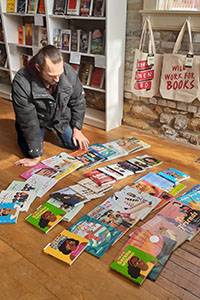
MA student Nick Langenburg surveys books from the MA Book Drive
Toni Morrison Memorial
On October 1, 2019, English Department held a memorial event honoring Toni Morrison. Faculty and students gathered as former Professor Regis Fox lead a remembrance of the iconic literary icon with readings, discussions and a chance to listen to Morrison in her own words. Professor Sherry Johnson also shared remarks during the memorial. After, the formal presentations, attendees had the opportunity to discuss Morrison's books in small groups while enjoying light refreshments.
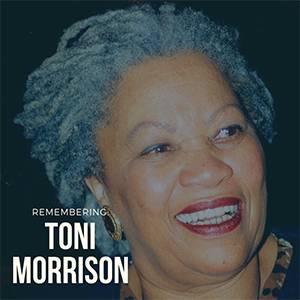
The English Department remembered Toni Morrison during an event in October 2019
GVSU Hosts MITESOL Conference
Michigan Teachers of English to Speakers of Other Languages, the state professional association for English language professionals, held its annual conference at GVSU on November 1-2, 2019, at the Eberhard Center. The event brought together more than 300 educators, teacher-educators, researchers, publishers, paraprofessionals, and students from across the state for two days of professional development. Professor Colleen Brice, long-time board member and Past President of MITESOL, co-chaired the conference with President-Elect, Christina Kozlowski, Ed.D., who is ELA Administrator for Warren Consolidated Schools. They were assisted in their work by students in GVSU’s MA-Applied Linguistics program and the women who run the English Department (Rebecca Casler, Karynn Gregory, and Jennie Reed).
The theme of the conference—Collaboration for Success—focused on the many connections English Language Teaching (ELT) professionals establish with experts in other disciplines and members of the community to serve the needs of the increasingly diverse population of English learners at all levels, from K-12 through adult education. The program featured 78 concurrent sessions, as well as invited talks by representatives of the Michigan Department of Education, an attorney from the Michigan Immigrant Rights Center, a counseling psychologist who specializes in trauma, and faculty from GVSU’s English Department. These speakers addressed issues related to supporting students from immigrant and refugee backgrounds and legal rights of ELs, particularly those whose status may be undocumented. These presentations were complemented by keynote talks from two internationally-recognized scholars (Deborah Crusan, Ph.D., from Wright State University, and Nick Ellis, Ph.D., from University of Michigan), and a plenary by Madeline Magrovordato, Ph.D., from MSU.
This marked the second time in five years that GVSU hosted the professional association’s conference, with Prof. Brice serving as chair. As the state affiliate of the largest ELT professional association in the world, MITESOL offers valuable networking opportunities, particularly for graduate students just embarking upon careers in the field. The 2019 program included presentations by students in graduate programs from across three states, including four from our own MA-AL program: Melissa Dean, Olabisi Fajana, Nicole DeWindt-Horstman, and Thomas Rodgers.
The 45th conference also recognized the contributions of the many individuals who have volunteered their time and expertise to the organization over the years. Foremost among these was our very own Prof. Christy Pearson, who served as President of MITESOL from 2004-2006, co-edited the proceedings of the 2005, 2006, 2007, and 2008 conferences, and co-founded the MITESOL Journal, in addition to being a regular presenter and mentoring numerous student presentations over the past several decades. We wish Prof. Pearson the best as she approaches retirement from our program and the field.
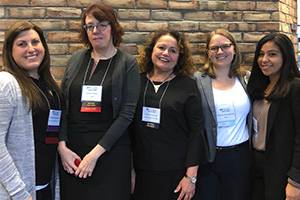
MITESOL 2019: Tina Kozlowski, Colleen Brice, Deborah Crusan, Madeline Mavrogordato and Jessica Gonzalez
Great Reads! Faculty Book Reviews
Colleen Brice, PhD
Watson, C. (2019). Semicolon: The past, present, and future of a misunderstood mark. New York: Harper Collins.
“Where do these rules I cherish so much, and believe I know so well, come from?” Such is the question that inspired the author’s ten-year investigation of what is, arguably, the most controversial punctuation mark ever penned. Watson shares her findings in this lively little hardback, managing to both debunk widespread myths about the nature of usage rules and inculcate respect for the utility of this much-beleaguered convention. The book traces the evolution of the semicolon, from its birth among 15th century humanists in Venice to the present, chronicling dramatic shifts in its use, popularity, and interpretation.
Along the way, we learn that punctuation was originally a matter of personal style; that punctuation rules emerged in the 19th century, largely as a by-product of grammarians efforts to make their discipline more like science; that far from clarifying intended meaning, punctuation has caused no end of confusion and consternation, particularly in the courts (everything from liquor sales to human life has hinged on interpretation of the semicolon); and that acclaimed writers employ semicolons in ways that extend well beyond the two main rules proscribed today.
Taken together, the ten brief chapters show us that punctuation rules are neither natural nor permanent. As social constructs linked more to prevailing fashion than syntax, they change. Given this, you might be wondering whether they’re pointless. Read the book to find out.
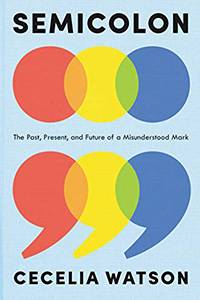
Semicolon by Cecelia Watson
Janet Navarro, PhD
This summer I read How to Be an Antiracist, by Ibram X. Kendi, a concise, partly autobiographical book that was profoundly life-changing. As the title implies, Dr. Kendi lays out how to become an antiracist and serves as an experienced guide. His deft, clear writing humbly invites readers to walk beside him, providing support and encouragement along the way. He accomplishes this, in part, by weaving brave self-disclosures from his own journey, sharing how he came to understand that he too had racist views, and what he did to change them. However, to assume this book is mostly a memoir would miss the mark.
Each of the 18 short chapters begins with razor sharp definitions that frame the information to follow. For example, he defines a racist as “One who is supporting a racist policy through actions or inaction or expressing a racist idea,” (p.13) and an antiracist as “One who is supporting an antiracist policy through actions or expressing an antiracist idea,” (p. 13). The concepts explored in each chapter build from the one before it. In this way, step by step, readers can develop deeper, more complex understandings of how race and racism have shaped society and molded us. He provides fascinating historical evidence and current examples to support his argument that racist ideas undergird the post-colonial world we all live in yet experience in vastly unequal ways. He shows how racist ideas undergird institutions and how those ideas are used to justify inequality. He explains how racist ideas are twisted into policies and practices and then used to justify inequity, and how each of us tend to rationalize our own racist behaviors with the racist ideas we have been socialized to believe are true.
On a personal note, I found this book liberating. While I never considered myself to be “a racist” I came to realize that I have indeed supported policies and believed in some commonly held assumptions about race, that I now know make me racist. This book has set me on a path to reflect on, unlearn, and replace the racist assumptions I was socialized to believe. I’m grateful to Dr. Kendi for offering a way forward.
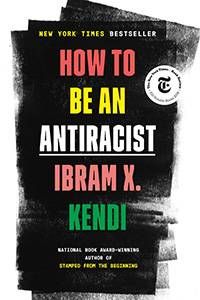
How to Be An Antiracist by Ibram X. Kendi
Ivo Soljan, PhD (retired)
Everything, absolutely everything, in the Universe, has a voice. Centuries ago, “they” used to call it “The Music of the Spheres,” focusing on its perfect harmony. Today, with our newest scientific instruments and methods, we have come to realize that these endless voices go well beyond what we consider music and harmony, for the Universe also screams, explodes, whispers, grumbles, moans, and produces an unimaginable cacophony. But, then, even the so-called modern music, of the early 20th century, and beyond, the atonal music of Arnold Schoenberg and his followers, comes very close to that cacophony, hardly inspiring us to “shout for joy” and wish to listen to these pieces once again. So much for the present-day singing of the “morning stars.”
However, fortunately, the harmonious, traditional, music of the human species has a very long and still hugely enjoyable tradition and contemporary presence, visibly thriving, even as I am writing this (200 words, or else! ☹) sketch of one of my many, summer 2020, enjoyable activities. A friend and colleague of mine, Professor Emeritus Vinko Grubisic (Groobishich), of Waterloo University, in Canada, had asked me to review, for a reputable peer-reviewed journal, one of his numerous books, this time a multilingual anthology of numerous (69) poems, about the nightingale and its incomparable song. Entitled The Winged Song: Philomela and the Nightingale, in the Poetry of the West, Zagreb, Croatia 2012 (parallel texts – the original 69 texts and the author’s own translations into Croatian). The poems are some of the best-known examples of the poetic presentations of the myth of the rape of Philomela and her transformation into a sweet-throated tiny bird, but also various poetic glorifications of its song and its rich symbolism, especially in the erotic sphere of human experience. The originals include the poems in Ancient Greek, Latin, Medieval Latin, Old French and Modern French, English, German, Italian, Spanish, Russian, and Danish.
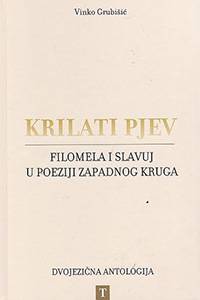
Winged Song: Philomela and the Nightingale in Western Poetry – A Bilingual Anthology - Vinko Grubišić
Revelations
David Alvarez, PhD
On a summer's evening ten years ago, during a visit to my home country of Gibraltar, I stepped out onto a balcony at dusk and took in the view, a small act of sustained looking that would completely transform my pedagogical and scholarly pursuits. My friend's balcony enjoys a commanding view of the Strait of Gibraltar, the narrow channel that links the Mediterranean Sea and the Atlantic Ocean, even as it separates Africa and Europe. As I gazed at the coasts of Spain and Morocco and at the waters that flow between them, it occurred to me that in a few hours' time boats transporting migrants and refugees would set out from the Strait's Moroccan shores in hopes of reaching Spain's under cover of darkness. By then I knew that during the previous decade Spanish and Moroccan writers alike had penned literary explorations of trans-Strait unauthorized migration, the precursor of Europe's so-called "refugee crisis." What I didn't know was whether there was any scholarship that compared and contrasted these two literary streams. I realized that if the topic hadn't already been written about comparatively, as a scholar of comparative literature and as a native of the Strait region I'd be well placed to tackle the task. And so it's come to pass that after devoting ten years to researching, teaching, and disseminating scholarship on the subject, I'm poised to complete my first book on it. All thanks to that evening when I gazed at the view I grew up with!

Strait of Gibraltar, springtime
Colleen Brice, PhD
I was recently reminded of the value of an aspect of my work—namely, the responsibility to prepare English professionals who can not only employ usage rules in their writing but also critically interrogate these rules and the ideologies underlying them. This reminder came via an unusual route. A colleague in another college asked me to review a manuscript that one reviewer had characterized as “full of errors.” No issues were marked, but the reviewer alleged the writer didn’t know how to use commas, semicolons, or colons, and questioned how they hoped to be published if they “didn’t know writing basics.”
In my review, I found no errors in punctuation, including the use of the semicolon, about which my colleague expressed concern. What I tried to communicate in my reply was threefold: the reviewer’s assessment was wrong; punctuation is governed more by stylistic preference than syntax and varies across time and variety; and finally, that I found the feedback inappropriate.
So, (why) does this matter? Because punctuation is a proxy for power, as Cecilia Watson deftly explains in her book on semicolons (reviewed in this issue): “The semicolon is a place where our anxieties and our aspirations about language, class, and education are concentrated, so that in this small mark, big ideas are distilled down to a few winking drops of ink” (2019, p. 5). Who decides whether successive independent clauses separated by semicolon are sufficiently related? Who makes and enforces “the rules”? The answers to these questions are neither insignificant nor apolitical. I need to make sure my students know this, too.
[1608148358].jpg)
Punctuation humor courtesy of Toothpaste For Dinner
Lindsay Ellis, PhD
I admit it. I like conflict. I am wary of consensus, of what Chimamanda Adichie calls “the danger of a single story” (2009). Yet on my upcoming sabbatical, I plan to study memoirs—one author, one voice. Do memoirs tell a single story? Not if the reader digs a little. I come to my interest in conflict through my own narrative as a great-great-grandchild of slave owners across the South and of Jim Crow-enforcing bankers and lawyers in Atlanta after Reconstruction. I grew up in a polite and visually beautiful environment, yet many weeks after Sunday dinner, my mother went into her bedroom and cried, releasing all that she was not allowed to say. Although my family told a single story, all around us in the city of Atlanta were other voices. While my maternal great-grandfather was mayor, W. E. B. Du Bois was publishing as Professor of Economics and History at Atlanta University. While my paternal great-grandfather was judge, Lugenia Burns Hope was organizing a Neighborhood Union to control funding for black YWCAs. While my grandfather was president of a bank, Martin Luther King Jr. was preaching at Ebenezer Baptist. Growing up, I heard other stories from the black girls in my summer camp cabin. When I was eighteen, I left Atlanta for Chicago, and needless to say, there’s no longer a single story in my head. Because writing is internalized speech made external again (Bruffee 1984), by lining words up in tidy rows, we can pick them up and see where they came from. As writers, we have a responsibility to orient ourselves ethically to the histories that animate our words, and to acknowledge the limits of our knowledge of those histories. I think Chinese-American memoirist Maxine Hong Kingston has it right when she admits that she doesn’t quite know when a story in her memory is Chinese and “what is peculiar to childhood” (1975, 5). Writing is her method of sorting this out. In my own family, peace and beauty were tenuously erected on top of a single story that tried to enforce silence beneath it. That kind of peace is no utopia. As Adichie writes, borrowing words from Alice Walker, “when we reject the single story, when we realize that there is never a single story about any place, [that is when] we regain a kind of paradise.”
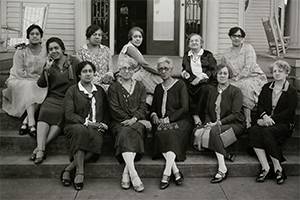
Lugenia Burns Hope and the Atlanta Neighborhood Union
Shinian Wu, PhD
One of my passions outside my day-to-day teaching is to find out what other countries do to train their English-as-a-second language teachers. To me, we always need to “think outside the box” when we try to come up with innovative ways and fresh ideas beyond our west Michigan bubble. This passion is not merely altruistic; it inherently serves my own personal and intellectual curiosity. That’s why I jumped on the opportunity to visit the west African nation of Ghana with my colleague Laura Vander Broek more than ten years ago and returned there one more time a couple of years later to learn as much as possible about the country’s ways of training its English teachers. I’ve also spent time in Germany and the UK learning about their English teacher education curricula and how they train teachers. As a native of China, I’ve made connections there to learn about how the Chinese face the challenges of training qualified English teachers for the world’s largest population of English learners. Of course, I’ve also eyed the Americas beyond the United States, which I hope to visit one of these days, and almost succeeded in visiting Bosnia and Herzegovina years ago with a GVSU delegation.
I may call it my personal journey of self-learning to enrich myself and, along the way, to enrich my students here when I relate my experiences to them—what I have seen and observed, and more importantly, what we can all learn from our individual and collective experiences. To me, the focus is primarily on learning from others rather than the other way around: How the Ghanaians train their teachers with limited educational resources influenced by their colonial past; how the Britons can graduate their MA students within one calendar year while the same degree takes Americans two years and the Chinese three years to finish; and why the Germans are so proud of their educational system and believe it’s superior to the one in the US (yes, they do speak better English than Americans speak German!). After coming back from Ghana, my colleague Laura and I contributed a chapter to a TESOL book on global English teacher education. My counterpart in the UK and I have co-presented on TESOL curricular models at the University College London’s Institute of Education and are currently co-writing a paper; and my collaboration with Chinese colleagues has resulted in two journal papers, one soon to be published and one submitted.
So there is still a life outside classroom teaching, and this life, needless to say, is closely tied to teaching!
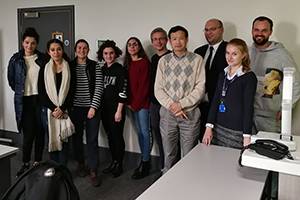
Professor Wu and students at Kingston University in the UK
English Department: Life in the Time of COVID
When Life Imitates Literature
As the new semester began to unfold in January 2020, no one could have predicted how the rumblings of a virus that had been discovered on the other side of the world would impact our lives - as individuals, as professionals, and as students.
Professor Kathleen Blumreich found herself in quite a unique position. Having decided to center her ENG 105 course around the theme of dystopian fiction, Blumreich was suddenly faced with a reality that much of her selected course materials had the potential to be far more impactful or even personal as the global pandemic began to unfold more significantly.
As she explained to GVNext in April, "I shifted focus away from the horror of the pandemic to those other things, the importance of friendship, bonding, communication, theater, all of those things that last as opposed to the aspects of civilization that are lovely to have but not absolutely essential." The class closed out the semester by building their own utopias as part of a group project.
To read the full article on Blumreich's teaching experience during the early days of the pandemic, click here.
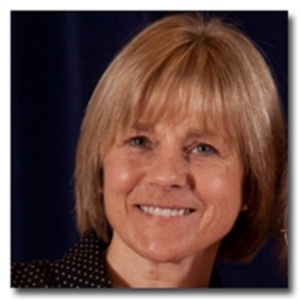
Professor Kathleen Blumreich
English Elementary Education Alumna Makes the Best of Teaching Virtually
Early on in the pandemic, Professor Amy Masko took note of some Facebook posts by a former student. Amber Main, who received her degree in English with a focus on elementary education in 2018, found herself in a position like many other teachers in April 2020 - she was suddenly teaching her second graders at Gladiola Elementary, part of Wyoming Public Schools, virtually.
Determined to stay engaged with her students, Main started creating daily challenges. One day, her students were challenged to create a reading fort (which Main herself did as well); another day they were tasked with creating a new toy.
As the pandemic wears on, Main continues to find new and innovative ways to keep her students engaged while instructing them remotely: "COVID continues to impact the way I teach every day. But it has also created an opportunity to be creative in my practice and to experiment with technology in ways that I never have before. Despite the daily obstacles that remote teaching brings, I continue to look for ways to stay connected with my students and to keep them engaged in their learning. Sometimes all it takes is switching up your space and diving into a good book to bring some life to our computer screens."

Amber Main, '18, in her reading fort, April 2020
MA alumna participates in and writes about AstraZeneca COVID-19 Vaccine Trial
English Professor Rob Franciosi recently discovered an op-ed in The Independent written by Master of Arts in English alumna, Karie Luidens. In the piece, Luidens discusses her experience participating in AstraZeneca's COVID-19 vaccine trial. Described as "a talented graduate student and technological pioneer," Franciosi recalls that Luidens wrote an impressive thesis on Walt Whitman and science. She completed her project from a distance while living in New Mexico and defended it via Skype, a first for the English MA program.
Luidens shared the following about how she's been navigating the pandemic, her participation in the vaccine trial, and her experience writing the op-ed:
"Throughout the COVID-19 pandemic, I’ve felt both lucky that I can safely work from home, and frustrated that I couldn’t do more to help others who are on the front lines in medicine, grocery, retail, and so forth. I’ve also felt isolated, since I now live out in New Mexico while the rest of my family is still in the Midwest. Between personal risk factors like age and diabetes, and a general desire to protect others, none of us have traveled to see each other this year. Our motto: 'See you when there’s a vaccine.'
This vaccine study was an exciting opportunity for me to get involved and potentially help make that day come sooner. When they started recruiting local participants, I jumped at the chance to volunteer. And then I did what I always do: write about the experience!
I’ve enjoyed writing freelance for a number of publications over the years since my time at GVSU, from the local alt weekly paper to more niche websites about sci fi, photography, or poetry. This time around, with a timely topic of global significance, I decided to go bigger and pitch editors at international news outlets. I was thrilled when this op-ed found a home at The Independent, which is based in the UK.
Now I hope my involvement in this study can help people twice over: first by advancing the vaccine science itself, and second by giving readers a window into the process."
Read Karie's full op-ed in The Independent here.
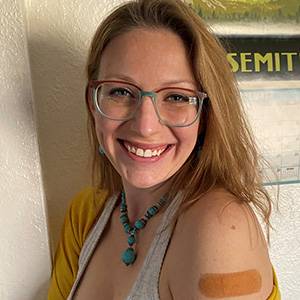
Karie Luidens, '17, after receiving the vaccine trial injection
Class of 2020 - Virtual Yearbook
The English Department was unable to celebrate those who graduated this past April in the usual manner. In light of this, English majors in the Class of 2020 were invited to participate in a virtual celebration of their achievements. Graduates who chose to participate were included in a virtual yearbook along with a photo of themselves and a quote, if they so chose.
The faculty and staff of the English Department are enormously proud of our graduates and all they've achieved during their time at GVSU. As Lakers for a Lifetime, we look forward to staying updated with news about their adventures and successes in the future!
You can view the virtual yearbook here: https://www.gvsu.edu/english/english-graduates-335.htm
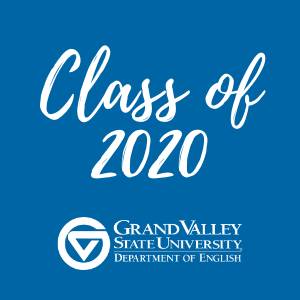
English Department 2020 Awards
Grand Valley State University's English Department Awards Ceremony was not held as usual due to the COVID-19 pandemic. However, we still celebrated a number of students by honoring them with awards. Congratulations to all of the recipients!
The English Department Scholarships
The English Faculty Scholarship for New Majors - Kurstin Frank; Kennedy Quirin
The Robert L. Chamberlain Memorial Scholarship - Lidia Vesterfelt; Allison Matz; Sabrina Gonzales
The Dr. Andrew M.C. Brown Memorial Scholarship - Hailee Green
The Gilbert R. & Patricia K. Davis Merit English Scholarship - Sidra Elvey; Madison Terpstra
The English Department Awards
The Distinguished Performance in Applied Linguistics Minor Award - Carly Vaitkevicius
The Distinguished Performance in the ESL Minors Award - Anisa Gabrielle Douglas Everett
The Distinguished Performance in Elementary Language Arts Award - Anisa Gabrielle Douglas Everett
The Distinguished Performance in Secondary English Education Award - Aimee Ash
Distinguished Performance in Literature Award - Sidra Elvey
University Awards for Excellence in a Discipline
University Award for Excellence in a Discipline: English BA Program - Anisa Gabrielle Douglas Everett
University Award for Excellence in a Discipline: English MA Program - Jennifer Kinne
University Award for Excellence in a Discipline: Applied Linguistics MA Program - Sarah Parlette
The English Department Oldenberg Writing Contest Winners
Personal Essay - Sophomore, Junior or Senior:
First Place - Chelsea Sheneman; Second Place - Hannah Kelly; Third Place - Leah Erben; Honorable Mention - Tasman Mattox
Analytical and Persuasive Essay:
First Place - Sidra Elvey; Second Place - Eleanor Zimmermann; Third Place - Haley Tanis
Poetry:
First Place - Meghan C. O'Neill; Second Place - Brooke Fugate; Third Place - Megan Markel; Honorable Mention - Sidra Elvey, Eleanor Zimmermann, Abigail Hasse
Fiction:
First Place - Amanda Pszcolkowski; Second Place - Sidra Elvey; Third Place - Chavala Ymker; Honorable Mentions - Robert Hyma; Alaina Taylor
Essay, Poetry, Fiction, or Drama - Graduate Student:
First Place - Nicholas Langenberg; Second Place - Josh Aldrich; Third Place - Britteany Duffus
Sigma Tau Delta Honor Cords
Aimee Ash, Alexandra Featherston, Abigail Lynn, Kennedy Sauer, Maria Scharrer, Madison Strait, Katherine Impellizzeri, Amanda Gabriel, Brandon Burger, Gillian Eisenbraun, Patrick Munro
Retirements
Congratulations to the following faculty members who have closed one chapter of their careers, and have opened another! Colleagues and students alike can attest to the ways that their teaching, service, and scholarship have contributed to what the English Department is today.
[1387291639].jpg)
Avis Hewitt, retired summer 2020
[1387291639].jpg)
Ben Lockerd, retired April 2020
[1387291639].jpg)
Jim Persoon, retired December 2020
[1387291639].jpg)
Ivo Soljan, retired December 2020
Proust Questionnaire
Developed by writer Marcel Proust, the Proust Questionnaire was once considered a parlor game by those in the Victorian era. Today, it's often used by modern interviewers.
The English Department decided to pose these questions to a number of our students. The following answers were provided by Ruth Reiniche (MA English ’06). We hope you enjoy this introspective, yet captivating close to this edition of our newsletter.
What is your idea of perfect happiness?
…unlimited time to read a good book that transports me….
What is your greatest fear?
I hate the dark, both literally and metaphorically.
What is the trait you most deplore in yourself?
Anxiety or lack of self confidence
What is the trait you most deplore in others?
Self-Righteousness
What living person do you most admire?
Michelle Obama
What is your greatest extravagance?
My hair
What is your current state of mind?
Isolated; Alienated
What do you consider the most overrated virtue?
Simplicity
On what occasion do you lie?
I try not to. I just stop talking when the truth will hurt someone.
Which living person do you most despise?
I’m not going there.
What is the quality you most like in a person?
Kindness
Which words or phrases do you most overuse?
Um…
What or who is the greatest love of your life?
Family
When and where are you happiest?
In front of a classroom…
Which talent would you most like to have?
I would like to speak ASL.
If you could change one thing about yourself, what would it be?
Self-discipline
What do you consider your greatest achievement?
Hopefully, I have not accomplished it yet.
Where would you most like to live?
Right here, Right now
What is your favorite occupation?
Talking to people
What is your most marked characteristic?
Talking to people
What do you most value in your friends?
Kindness
Who are your favorite writers?
Austen; Hemingway; Hawthorne; Morrison; Oates
Who is your hero of fiction?
Anne Elliot
Which historical figure do you most identify with?
Jane Adams
What are your favorite names?
The names of my children and grandchildren
What is it that you most dislike?
Self-Pity
What is your greatest regret?
I try not to look back with regret.
How would you like to die?
I wouldn’t. That is a question young people ask.
What is your motto?
If not now…when?
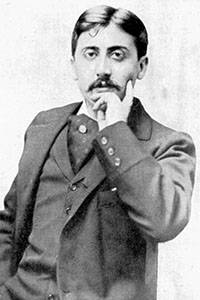
Marcel Proust
Follow us on Social Media for the latest happenings in the English Department!
English Matters
Published by the GVSU English Department
January 2021
Dr. Sherry Johnson, Editor
Jennie Reed, Assistant Editor
Nick Langenberg, Communications Graduate Assistant
Teague Suitor, Communications Graduate Assistant
Anne Oxendine, Communications Graduate Assistant


